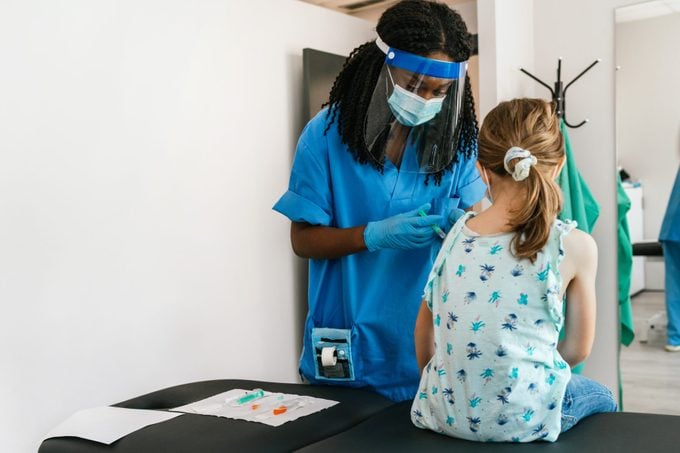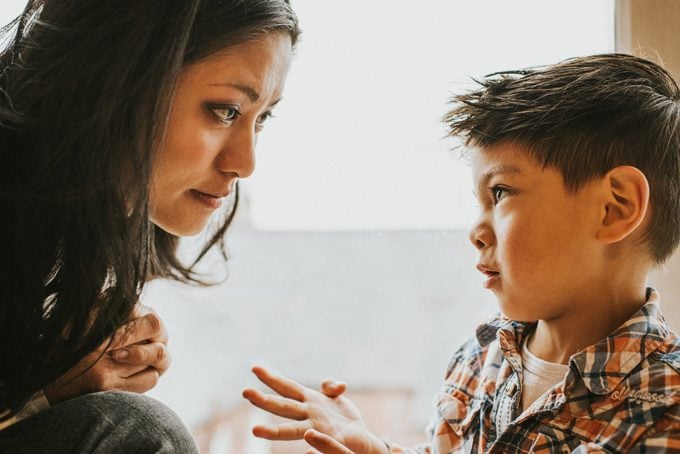Covid Vaccine for Kids: What You Need To Know
Updated: Mar. 30, 2022
More kids than ever are getting the disease and dying from it. The newly authorized pediatric vaccine is an effective way to keep your children safe. Our experts answer all your questions.
Covid-19 vaccines and kids
On October 29, 2021, the U.S. Food and Drug Administration (FDA) formally authorized the Pfizer Covid-19 vaccine for children ages 5 to 11. Within one week, nearly 1 million U.S. children in that age group had received their first shot—including Maisy, 5, and Sam, 11, of Denver, Colorado.
“I’d been waiting for the announcement and preparing our kids that it was coming, so as soon as I heard the news, I called our pediatrician’s office,” says their mom, Jill Fairchild, 48.
“They had already set up a vaccine clinic for the next day.”
The Fairchilds have two older children who are fully vaccinated, and they were relieved and excited to be able to get the rest of the family protected. The pandemic has been worrisome, but Fairchild’s worry skyrocketed as the number of cases in Colorado soared to near-record highs recently, and she got frequent email alerts of Covid-19 cases at her children’s elementary school.
Then, in early October, dad Mike, 50, caught the virus despite being vaccinated with the Johnson & Johnson shot. He didn’t require hospitalization, but how sick he got and how long it lasted was shocking and scary for the whole family.
“Honestly, I couldn’t wait to get the younger ones vaccinated,” says Jill.
“The kids weren’t excited about getting a shot, but we explained to them that it will protect them and protect other people, like their immunocompromised twin cousins. Plus, they would get to do way more stuff!“
The “covid clinic” is set up like a party at the pediatrician’s office, with balloons and stickers and music, so the kids feel more at ease.
“As soon as they got the shot, all the nurses and doctors clapped and cheered for them. They loved it, they felt really proud and like they were helping,” says Jill.
Health experts are hoping many more parents will make the same decision as the Fairchilds.

Why young children need a Covid-19 vaccine now
At the beginning of the pandemic, the virus seemed far more dangerous for older people, and children didn’t appear to get symptomatic cases or severe complications. Experts now say that narrative is false.
“The idea that children are low-risk for Covid-19 is just not true anymore,” says Preeti Parikh, MD, a pediatrician and spokesperson for the American Academy of Pediatrics.
“Even with all of the efforts we’ve made with efforts like masking, remote learning, and decreasing activities outside of school, we’ve seen over 8,000 hospitalizations of 5- to 11-year-olds because of the virus,” says Dr. Parikh, also a clinical assistant professor of pediatrics at Mount Sinai School of Medicine, and the medical director at GoodRx.
The U.S. Centers for Disease Control and Prevention (CDC) reports there have been more than 1.9 million Covid-19 cases in children ages 5 to 11, and that number is likely much higher as many cases of Covid-19 in children don’t get reported.
This increase in numbers is likely due to the “delta variant,” a mutation of the original SARS-CoV-2 virus that makes it more transmissible and more likely to cause illness in children.
“The delta variant has been more contagious for children and greatly increased the risk of hospitalization or serious illness such as Multi Inflammatory Syndrome in Children (MIS-C) or heart problems,” says Dr. Parikh.
In addition, children are a major part of public health and overcoming this pandemic, says Federico Ricardo Laham, MD, a researcher who’s worked on several pediatric vaccines and a pediatric infectious disease specialist at Orlando Health Arnold Palmer Hospital for Children.
In the CDC study, 40 percent of children, ages 5 to 11, were found to have antibodies to Covid-19, meaning that they had been infected—a far higher number than anyone had anticipated, says Dr. Laham. This is an issue because children can spread it to others even if they don’t show symptoms themselves.
“The vaccines, including this pediatric vaccine, aren’t just helpful, they are essential in fighting this disease,” he says. “They are the way out of this pandemic.”
How Covid-19 affects children under 12
This is a tricky illness, and doctors and researchers are still figuring out all the ways that Covid-19 affects people, both in the acute phase of the illness and later.
One thing is clear, however: Young children can and do get sick from Covid-19, and some of them are getting very sick and even dying, says Dr. Laham.
In fact, in the past several months, Covid-19 was the sixth leading cause of death in this age group, according to the CDC.
When first infected, kids experience the same types of symptoms as adults, including fever, chills, cough, difficulty breathing, runny nose, sore throat, fatigue, and body aches. But kids are at a much higher risk for a severe complication called MIS-C, a multisystem inflammatory condition that can be fatal.
According to a 2021 study published in JAMA, nearly 9,000 children have been hospitalized for Covid-19, and 5,200 developed MIS-C — with the average age being just 9 years old.
Children and teenagers are also at a higher risk for the heart complication myocarditis brought on by the illness.
Then there’s the question of what happens next. “We don’t know the long-term effects of Covid-19 in children, and ‘long-haulers’ syndrome is a serious concern for this age group, too,” says Dr. Parikh.
Even if children don’t get physically sick, they may still suffer emotionally and mentally. School closures, disruption of normal life, watching loved ones get sick or die, and media are causing rates of depression and anxiety never before seen in young children, says Dr. Laham.
“There has been a tremendous mental health toll on children during the pandemic, and the quicker we get them vaccinated, the faster they can get back to a more normal life,” says Dr. Parikh.
What is the pediatric Covid-19 vaccine?

As of now, the only FDA-authorized vaccine for children ages 5 to 11 is the Pfizer vaccine. It’s an mRNA vaccine given in a series of two shots, spaced 21 days apart. Each dose contains 10 micrograms. There is no booster shot for children authorized yet.
There are many myths and falsehoods online about vaccines, but a common one that pediatricians are hearing from concerned parents centers around the mRNA technology.
“There are lots of rumors spread on social media that mRNA vaccines can change a child’s DNA. This is absolutely false,” says Dr. Parikh. “mRNA vaccines simply cannot change DNA; mRNA never gets into the nucleus where the DNA, which is your genetic material, is stored.”
These vaccines work by providing the immune system instructions on recognizing spike proteins found on Covid-19 so the body can fight it immediately. Once the immune cells have used the instructions, they break down the mRNA and release it from the body.
“This process has been researched for decades, and we have lots of evidence that mRNA vaccines are safe and effective,” says Dr. Laham.
(These are the 10 Covid-19 vaccine myths no one should fall for.)
How does the pediatric Covid-19 vaccine differ from the adult vaccine?
The pediatric vaccine is the same formulation as the adult vaccine but differs in four ways, says Dr. Laham:
- Dose. The pediatric dose is one-third the adult dose.
- Shelf stability. The original Pfizer vaccine required cold temperatures, making it difficult to store and distribute. The pediatric vaccine has been modified to make it more stable at a wider range of temperatures.
- Color: Pediatric vaccines have a different color label to prevent confusion.
- Administration: Most adults receive the shot in their upper arm while children get the shot in their upper thigh.
Which children should get the shot?
“All eligible children should get the vaccine, and the sooner you can get your child vaccinated, the better,” says Dr. Parikh.
This is true even if your child has had Covid-19 in the past, says Dr. Laham.
The vaccine is not known to interact with medications and is not prohibited by most health conditions. Most children will be eligible, but always talk to your doctor about individual health concerns, he says.
How effective is the pediatric vaccine?
In a word: very. The pediatric vaccine was studied extensively and found to be 90.7 percent effective in preventing Covid-19 in children 5 through 11, according to the FDA data.
If a child does get a breakthrough case after vaccination, they will have milder symptoms and will be far less likely to need hospitalization, says Dr. Parikh.
What are the side effects?
The studies reported no serious side effects. The most common side effect was pain at the injection site, along with redness and swelling. A small percentage of kids reported muscle aches, fever, and fatigue. A smaller percentage of children reported any side effects than adults did.
There were some initial concerns about the vaccine causing myocarditis—an inflammatory heart condition—but the research found that children and adolescents are at higher risk of this complication from getting Covid-19 than from a side effect of the vaccine, says Dr. Laham. Zero cases of myocarditis were found in children under 12.
(Here’s how to deal with normal Covid-19 vaccine side effects.)
What can you do if you have concerns?
Parents who didn’t hesitate to get the vaccine themselves may have qualms about getting it for their young children.
An October 2021 KFF poll found that one third of parents say they will “wait and see” how the vaccine is working before having their 5- to 11-year-old vaccinated. Meanwhile, 30 percent say they definitely won’t vaccinate their 5- to 11-year-old, and 5 percent say they will only do so if their school requires it.
As a father of two young children, Dr. Laham says he understands the concerns.
It’s normal to be more worried about our children, especially when it comes to things that feel new or unknown, but many of those worries are based on myth and misinformation propagated online about the vaccine, he says. Both of his children have received the Covid-19 vaccine, a decision he feels very good about.
If you have worries, speak with your pediatrician and get information from reliable sources, like the CDC or the American Academy of Pediatrics. Avoid doing “research” on social media or relying on anecdotal stories from a “friend of a friend.”
“It’s a myth that there aren’t any studies or we don’t know enough yet to give this to kids or that it was developed too fast,” he says, adding that this is one of the most rigorously studied vaccines in history.
What can you do if your children are worried?

The conversation around vaccination has become highly politicized and even young kids may have heard some scary things. Children this age are also likely to be very nervous about getting any type of shot. The important thing is to talk to your children about the vaccine, listen to any worries they might have, and answer all their questions.
“Make it age-appropriate and tailor it to your child,” says Dr. Laham. For instance, younger children don’t need to know the technical details, but a 10-year-old who loves science may really enjoy hearing all about the vaccine development.
Keep young children off social media, where many vaccine myths abound.
In addition, focus on the positive aspects of how the vaccine will help them and others, and how it will give them more freedom in their daily life.
Lastly, lead by example. Your children are more likely to want the vaccine if you do, too.
Getting your younger children vaccinated is one of the best things you can do to protect them, your loved ones, and help bring this pandemic to an end.












